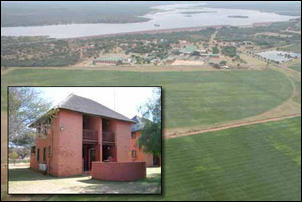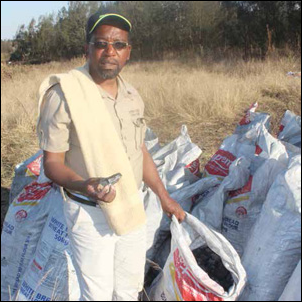Under the apartheid regime the lives of black communities across the country were disrupted. Many were forcibly removed from their ancestral land, the only home they knew, as a result of apartheid laws.
According to the Twenty Year Review, in 1994 most agricultural land (83 per cent) was owned by whites and only 17 per cent of the land was available for black people in the former homelands.
Over the past two decades, thousands of families who were forced to give up their land under apartheid have been compensated or handed back land.
Government introduced various land reform policies and initiatives aimed at giving land back. Since 1994, 5 000 farms, comprising 4.2 million hectares, have been transferred to black people, benefiting over 200 000 families.
In addition, 80 000 land claims, totalling 3.4 million hectares, have been settled.
Beneficiaries
Among the beneficiaries of land restitution are communities that were evicted from their ancestral land in the Maile, Mmamerotse, Tantanana, Bethanie, Phalane and Jericho villages, outside Brits in North West.
 The evictions here took place in 1922, 1923 and 1963.
The evictions here took place in 1922, 1923 and 1963.
In 1995, when government invited people to launch claims, the six villages joined hands to launch one claim because the land they were evicted from was now called Tweerivier 197 JQ.
In 1999 they succeeded with their claim and government bought back 6 100 hectares of land on their behalf. Efforts by community members to return to their ancestral land were delayed by infighting. Other members from different villages launched a counter claim and that distracted the process.
According to community member Charles Moagi, government told them that until they sorted out their differences, no land would be handed over to them. “The counter claim by others and the infighting dealt the two groups a blow as both of them could not receive the land they had claimed,” he said.
Joint claim
In 2004 the two groups decided to come together, formed a Communal Property Association (CPA) and launched a joint claim. That’s when things started to move in the right direction. They agreed on the name Dikgatlhong for the CPA and came up with a memorandum of agreement binding them to work together.
“Dikgatlhong was chosen because the name itself means the coming together and it united the two groups. We realised that the infighting wasted a lot of energy and time, hence we came together,” said Moagi, chairperson of the Dikgatlhong CPA, which represents 203 families.
 The CPA manages the land, which is divided into various sections, on behalf of the families. Dikgatlhong Game Farming and Lodge occupies 2 000 hectares, irrigation crops occupies 3 340 hectares and the cattle farming project occupies 565 hectares - all of which was bought by the Department of Rural Development and Land Reform for the community. The farm produces maize, soya beans, sunflowers and vegetables.
The CPA manages the land, which is divided into various sections, on behalf of the families. Dikgatlhong Game Farming and Lodge occupies 2 000 hectares, irrigation crops occupies 3 340 hectares and the cattle farming project occupies 565 hectares - all of which was bought by the Department of Rural Development and Land Reform for the community. The farm produces maize, soya beans, sunflowers and vegetables.
“Though the land belonged to our ancestors, government wanted us to explain in detail what we wanted to do with the land and that’s when we came up with what we called the master plan. That plan explained in detail what we wanted to do.
“It spoke about our plans to lease some of the land, plough some of the land and involve our young people in the running of the lodge,” explained Moagi.
He added that to prevent the possibility of the farm collapsing, they established a good working relationship with the previous occupants of the farm.
“We retained the skilled people who were working on the farm to ensure that there was continuity and skills transfer.”
Bursary scheme
The lodge created 25 direct jobs and employed locals from different villages. It created part time jobs and there’s also talk of starting a bursary scheme for young people who want to pursue a career in farming, game and wildlife conservation.
Moagi said the secret of Dikgatlhong’s success was that they did not antagonise the previous owners and occupants of the farm. He warned other CPAs not to fall into the trap of alienating the previous owners of land, as this would prevent skills transfer to the new occupants.
Babanango
Another community to benefit from the land restitution programme is that of Babanango in Zululand, north of KwaZulu-Natal.
In the 1950s, 192 families had to leave behind this land – dubbed little heaven because of its majestic mountains, flowing rivers and wildlife - as part of apartheid’s forced removals.
In 1997 these families, under the banner of the Emcakwini Community Trust, lodged a claim to get their land back.
Ten years later the land was handed over to the trust and the people of Babanango put the land to work, said the trust’s chairperson Eric Buthelezi.
“The community has now turned pain into prosperity by making sure that the 19 000 hectares of land is used to improve the community,” he added.
Businesses
The trust’s beneficiaries have set up lucrative, sustainable businesses such as farming, forestry, charcoal manufacturing and sew milling. With all these businesses, the trust is the leading employer in Babanango, employing about 160 people.
When the trust received the land, most of the wattle, gum, and pine trees on it were damaged.
“We decided to take the damaged trees and turn them into coal. This helped bring cash flow into our business and also made way to plant new trees where the damaged ones were.”
This gave birth to the trust’s charcoal business in 2008. To kick things off, the trust bought charcoal ovens needed to make charcoal. It was through the sale of charcoal that the trust started paying off its debt.
The charcoal business employs about 24 people. “We sell the charcoal to a company called Coastal Fires in Stanger. The agreement is to supply them as for as long as we can,” Buthelezi said.
The trust received R5 million from the National Development Agency (NDA) for their charcoal business. The trust also produces crop and recently harvested 500 hectares of vegetables such as mealies and beans, which bought 20 employment opportunities.
In addition, there are two lodges on the land, one of which is operational.
“The owner of the Babanango Guest Lodge pays occupational rent to the trust and employs about 40 people. Our land is also rich in game. We have zebras, bucks and impalas which serve as a tourist attraction.”
The trust also has a sew milling plant, which produces beams used in houses. These beams are made from the trees on the land. “The plant employs about 15 people from the community,” said Buthelezi.
Buthelezi’s ultimate aim is for the young people of Babanango to benefit from the trust’s initiatives.
Emcakwini Community Trust’s success is a testament to what South Africans, who have been victims of injustices in the past, can achieve under a democratic government.



 Facebook
Facebook Twitter
Twitter WhatsApp
WhatsApp